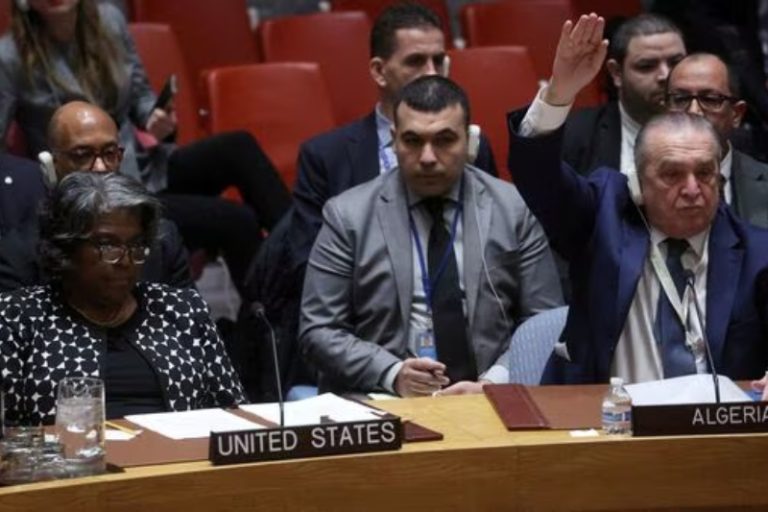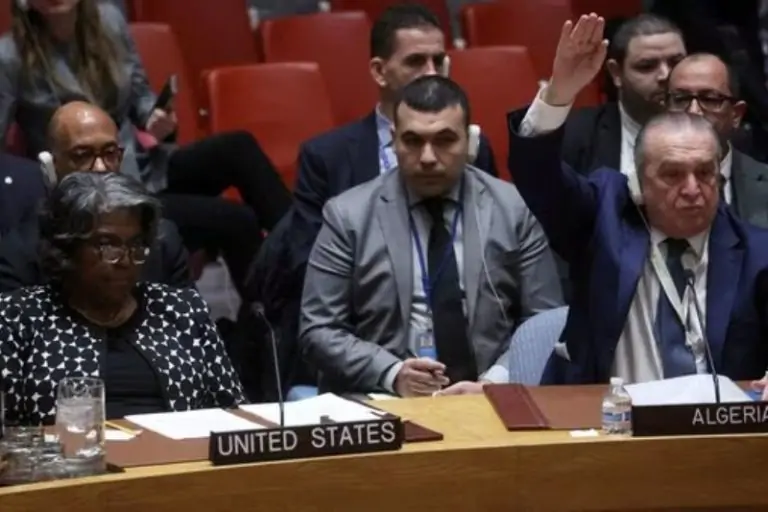

algerian cease fire push thwarted us issues third un veto amid gaza crisis
The US has once again used its veto power to block a UN resolution that Algeria spearheaded, calling for an immediate cease-fire in the escalating Gaza conflict. The move, marking the third such US veto, underscores the deepening diplomatic deadlock and raises questions about the efficacy of international interventions in the region.
Beyond the immediate conflict, the Algerian-led resolution has brought Africa’s concerns to the forefront. African nations, echoing Algeria’s call for a cease-fire, express worries about the broader implications of the Gaza crisis on regional stability and the potential for a ripple effect across the continent.
The diplomatic clash between the US and Algeria reveals the intricacies of global power dynamics. While Algeria advocates for immediate intervention to safeguard Palestinian lives, the US cites strategic considerations and ongoing negotiations, emphasizing the delicate balance required for a sustainable resolution.
As tensions rise in Gaza, African nations emphasize the need for a nuanced approach that considers the complex socio-political landscape. The Gaza crisis resonates with African nations grappling with their own challenges, shedding light on the interconnected nature of global conflicts and the importance of a unified stance against violence.
The US veto not only impacts the immediate Gaza situation but also casts a shadow on the future of African diplomacy within the UN. African nations face the challenge of navigating geopolitical alliances while advocating for humanitarian principles, emphasizing the delicate dance required to address regional conflicts effectively.
Despite the setback, Algeria and its African allies may pursue alternative avenues to advocate for a cease-fire. The General Assembly becomes a potential platform for non-binding resolutions, allowing African nations to voice their concerns and rally international support, even as they confront the limitations imposed by the Security Council.
The US countered the UN resolution with its own draft, emphasizing a short-term cease-fire contingent on hostage release. US Ambassador Linda Thomas-Greenfield argued that their resolution would pressure Hamas into a hostage deal and facilitate humanitarian assistance. However, critics view this as a hindrance to immediate intervention and a potential green light for Israel’s military actions.
While the UK abstained from the vote, the majority of Security Council members expressed apprehension about the potential humanitarian catastrophe in Gaza’s southern city of Rafah. Israeli Prime Minister Benjamin Netanyahu’s plan to shift military operations to the Egyptian border adds complexity, leaving approximately 1.5 million Palestinians in a precarious situation.
Accusations flew between delegates, with the Palestinian envoy asserting that the US veto signals approval for Israel’s actions, leading to more casualties. The warning of increased suffering, particularly for vulnerable populations, intensifies the urgency for a resolution. The diplomatic discourse reflects the high stakes involved and the struggle to find common ground.
As the fate of the UN resolution hangs in the balance, uncertainty looms over the next steps. The Arab Group may present the resolution to the General Assembly, where adoption seems likely, though legally non-binding. The differing approaches and underlying tensions may further strain relations between the US and Israel, adding complexity to an already delicate situation.
Two mobile telecom leaders, MTN Group and Airtel Africa, joined forces to create a new digital infrastructure system throughout African…
South African President Cyril Ramaphosa defended his nation against claims of white discrimination made by tech magnate Elon Musk. After…
Hilton launched Signia by Hilton for its first appearance in Egypt and Africa through its hotel expansions. These hotels at…
UNICEF reported that, nearly 2900 people died of cholera across Eastern and Southern African countries while children suffer most greatly…
Enza, based in the United Arab Emirates, obtained $6.75 million in initial investment funding from Algebra Ventures and Quona Capital.…
US Secretary of State Marco Rubio ordered South African Ambassador Ebrahim Rasool to leave America by March 21 because he…
This website uses cookies.